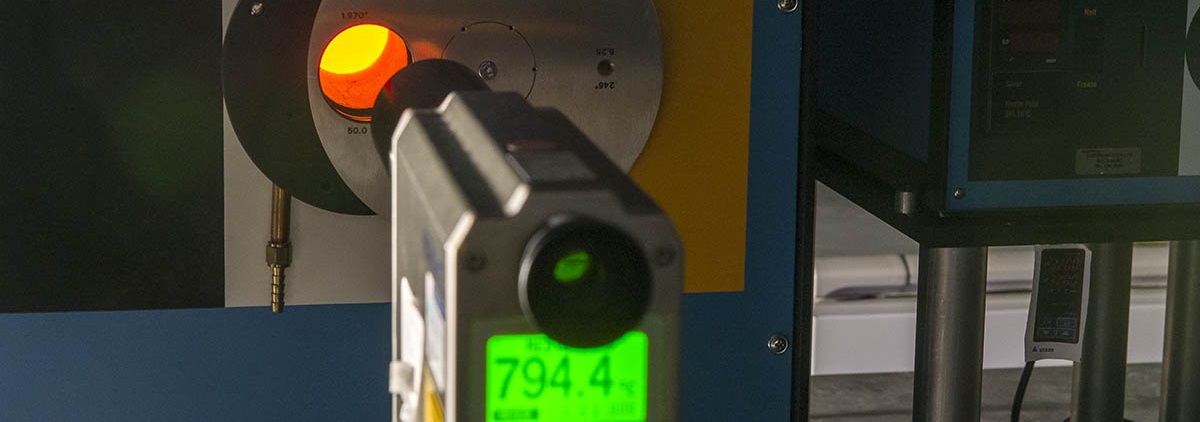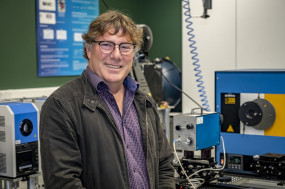Infrared Radiation Thermometry Workshop
Training course
This is a practical course covering problems with the use and calibration of infrared radiation thermometers, including reflections, absorption, emissivity, and instrumental effects. The course builds confidence in non-contact temperature measurements in the range −50 °C to 2000 °C.

Overview
Infrared radiation thermometry is a fast-growing area of temperature measurement. Applications range from high-temperature measurements in the hostile environments typically found in the petrochemical and steel industries, to low-temperature measurements in food processing and storage industries where non-contact measurement is important.
More than for any other type of thermometry, reliable measurements are dependent on the expertise of the user, and can only be obtained through a thorough understanding of the principles and best measurement practices. The aim of this course is to provide that knowledge and understanding.
The course is interactive to ensure you benefit from the experience of the presenter and fellow participants.
Note: This workshop will only proceed with sufficient numbers. If we need to cancel, you will be notified three weeks before the start date.
Course fees:
-
$1,120 for each of the first two attendees from an organisation, and
-
$784 for each additional attendee
Presenters

Peter Saunders
Distinguished Scientist | Temperature and Humidity
Peter has been working at MSL since 1993 in the area of radiation thermometry, carrying out research in both metrological radiation thermometry and industrial applications. He has worked as a visiting researcher for eight months at IMGC (now INRiM) in Italy, where he investigated the application of CCD cameras to radiation thermometry.
Peter has published more than 70 papers and articles on radiation-thermometry-related topics, and is author of the book Radiation Thermometry: Fundamentals and Applications in the Petrochemical Industry. He won the NZ Royal Society Cooper Medal in 2004 for research he carried out in understanding the physical basis of equations used in the calibration of radiation thermometers. He represents New Zealand on the CIPM’s Consultative Committee for Thermometry (CCT) is an active member of the CCT Working Group on Non-Contact Thermometry.
Scientific highlights for Peter include work on: the size-of-source effect in radiation thermometers, the measurement of non-linearity using a combinatorial technique, analysis of a double-wavelength technique for measuring thermodynamic temperature, calibration equations for radiation thermometers and uncertainty propagation, and reflection errors in industrial radiation thermometry.
Peter is a technical expert for many IANZ accredited thermometry laboratories in New Zealand.
Outline
The Course is Suitable For:
Anyone who uses infrared thermometers as a part of laboratory testing, plant installation and maintenance, or any general monitoring and maintenance tasks at both high and low temperatures.
General Programme and Learning Outcomes
The course focuses on the errors that occur in radiation thermometry, but also covers care and calibration, and using and choosing the thermometer.
Topics include:
- Principles
- Blackbody radiation
- Emissivity
- Blackbodies
- Reflection errors
- Size-of-source effect
- Thermal imaging
- Radiation thermometer types
- Calibration
- Errors and uncertainties
- High- and low-temperature applications.
Course Qualification:
Students will receive a course attendance certificate.
Date and Venue
21 July 2025
Lower Hutt
Callaghan Innovation
Alan MacDiarmid Centre
69 Gracefield Road, Gracefield
Lower Hutt 5010
0800 422 552
- Free Parking
- Report to Reception
- Approximately 45 minutes drive from Wellington Airport and 30 minutes from Wellington CBD
Course Times
- 8:30 am – 9:00 am
Welcome tea and coffee
- 9:00 am – 5:00 pm
This course commences at 9:00 am sharp and is expected to end by 5:00 pm.
Catering
Catering includes Morning Tea and Lunch. Please indicate dietary requirements on the registration form.
